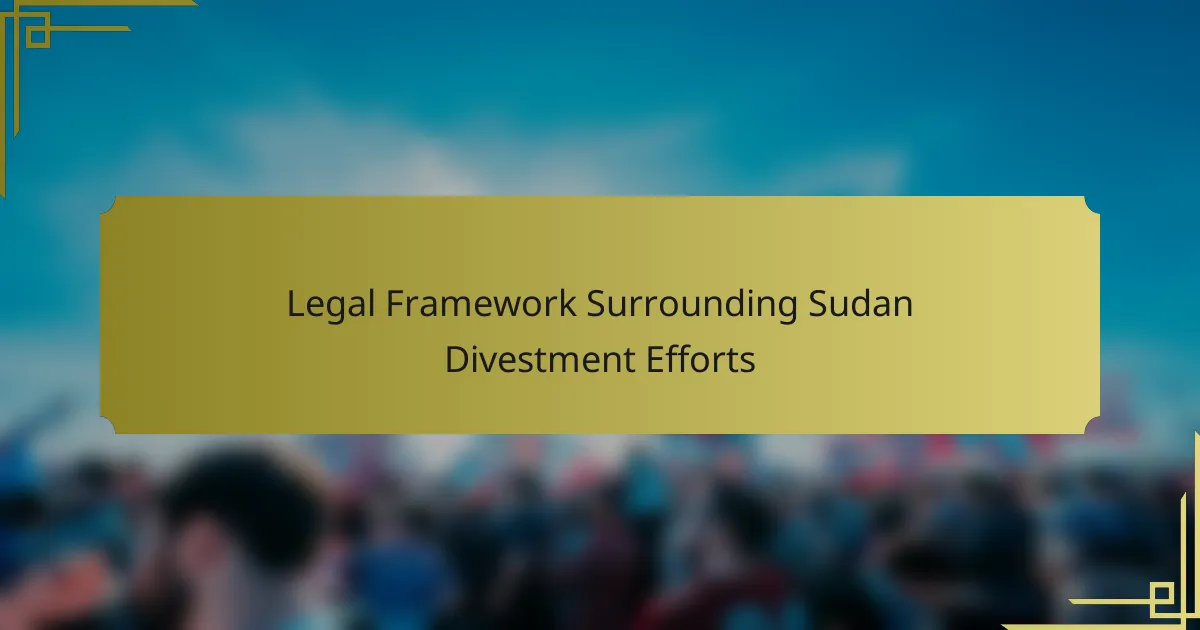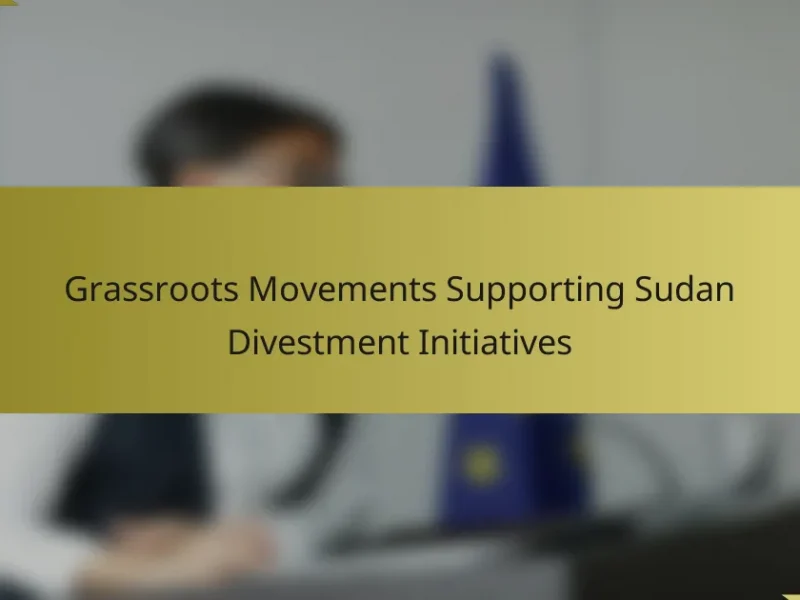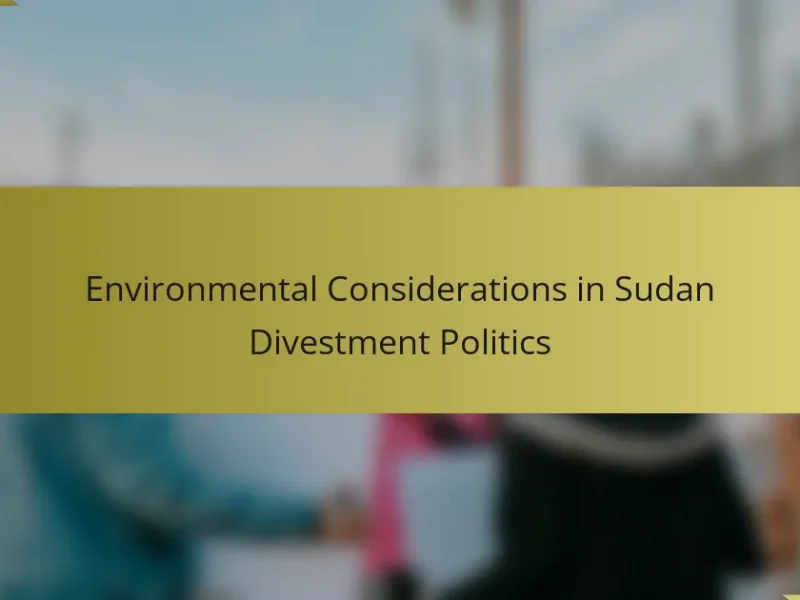The legal framework surrounding Sudan divestment efforts encompasses state and federal laws that impose investment restrictions on companies operating in Sudan, primarily in response to human rights violations and the Darfur conflict. Key regulations include state laws mandating divestment and the federal Sudan Accountability and Divestment Act of 2007, which supports state-level actions against entities linked to the Sudanese government. This framework significantly influences the behavior of stakeholders, including companies and institutional investors, by establishing ethical guidelines and compliance requirements. The evolving nature of this legal landscape suggests potential changes driven by geopolitical factors, increased international pressure for ethical investment, and ongoing dialogues among stakeholders, which will shape future divestment strategies and effectiveness.
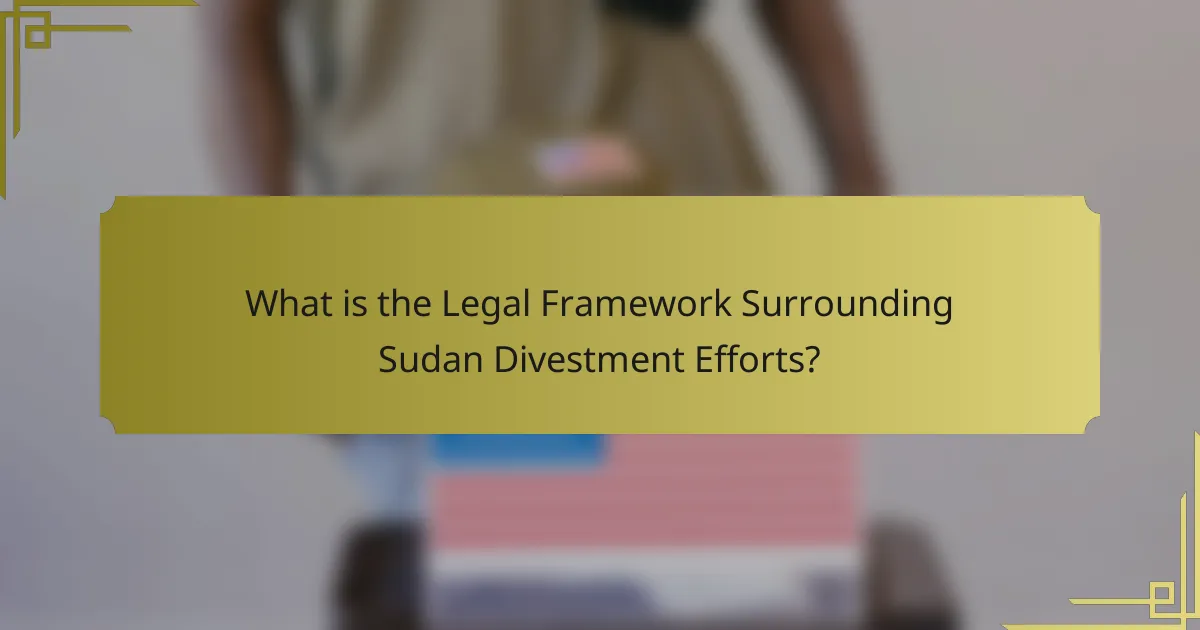
What is the Legal Framework Surrounding Sudan Divestment Efforts?
The legal framework surrounding Sudan divestment efforts primarily involves state and federal laws that govern investment restrictions. Various U.S. states have enacted laws mandating divestment from companies operating in Sudan. These laws aim to respond to human rights violations and the Darfur conflict. Federal legislation, such as the Sudan Accountability and Divestment Act of 2007, encourages divestment from entities supporting the Sudanese government. This Act empowers states to divest from companies that do business in Sudan. Additionally, many institutional investors follow ethical guidelines that align with these laws. The legal framework is designed to pressure the Sudanese government to change its policies.
How did the legal framework for Sudan divestment originate?
The legal framework for Sudan divestment originated from concerns over human rights violations in Sudan. In the early 2000s, the U.S. government and various advocacy groups highlighted the Darfur conflict. This led to the passing of the Sudan Accountability and Divestment Act in 2007. The Act encouraged states and investors to divest from companies operating in Sudan. It aimed to pressure the Sudanese government to cease its human rights abuses. Numerous states enacted their own divestment laws following this federal legislation. These laws targeted specific sectors, such as energy and military. The legal framework evolved as a response to international humanitarian concerns and advocacy efforts.
What historical events influenced the creation of this legal framework?
The legal framework surrounding Sudan divestment efforts was influenced by several historical events. The Darfur conflict, which began in 2003, drew international attention to human rights abuses in Sudan. In response, various organizations advocated for divestment from companies supporting the Sudanese government. The U.S. passed the Sudan Accountability and Divestment Act in 2007. This act aimed to impose economic pressure on the Sudanese government to halt its actions in Darfur. Additionally, the International Criminal Court issued an arrest warrant for Sudan’s president, Omar al-Bashir, in 2009. This further galvanized divestment efforts globally. These events collectively shaped the legal framework to promote humanitarian objectives through economic measures.
What key legislation has been enacted regarding Sudan divestment?
Key legislation regarding Sudan divestment includes the Sudan Accountability and Divestment Act of 2007. This act was enacted to encourage divestment from companies operating in Sudan. It aimed to address the humanitarian crisis in Darfur by targeting investments that support the Sudanese government. The act allows state and local governments to divest from these companies. Additionally, it mandates reporting requirements for entities involved in divestment. The legislation reflects a broader effort to apply economic pressure on Sudan. It highlights the role of financial markets in influencing governmental behavior.
What are the main components of the legal framework?
The main components of the legal framework include statutes, regulations, case law, and constitutional provisions. Statutes are laws enacted by legislative bodies. Regulations are rules created by governmental agencies to implement statutes. Case law consists of judicial interpretations of statutes and regulations. Constitutional provisions establish the foundational legal principles and rights. Together, these components create a comprehensive legal system that governs various aspects of law and policy.
What roles do international laws play in Sudan divestment efforts?
International laws play a crucial role in Sudan divestment efforts by establishing guidelines for ethical investment practices. These laws often aim to prevent financing entities involved in human rights violations. For instance, sanctions imposed by the United Nations and the United States restrict trade and investment in Sudan. Such sanctions influence companies to withdraw their investments to comply with international regulations. Additionally, international humanitarian laws highlight the responsibilities of businesses to avoid complicity in abuses. This legal framework encourages divestment as a means of promoting accountability and supporting peace initiatives in Sudan.
How do national laws impact divestment strategies related to Sudan?
National laws significantly influence divestment strategies related to Sudan by establishing regulatory frameworks. These laws can mandate or incentivize companies to withdraw investments from Sudan due to human rights concerns or sanctions. For instance, the U.S. government has implemented sanctions against Sudan, which compel American companies to divest from certain sectors. Additionally, countries may enact laws that facilitate or restrict financial transactions with Sudan, impacting investment decisions. Compliance with these laws is crucial for companies to avoid legal repercussions. Therefore, national laws serve as both a barrier and a guide for divestment strategies concerning Sudan.
What challenges does the legal framework face?
The legal framework surrounding Sudan divestment efforts faces several challenges. One major challenge is the lack of clear regulations that guide divestment processes. This ambiguity can lead to inconsistent application of laws across different jurisdictions. Another challenge is the potential for conflicting interests between state and federal laws. Such conflicts can complicate compliance for businesses looking to divest. Additionally, there are concerns about the enforcement of divestment laws. Weak enforcement mechanisms may hinder effective implementation. Furthermore, the evolving political landscape in Sudan adds uncertainty to divestment efforts. This unpredictability can deter investors and complicate legal compliance. Lastly, there is often limited awareness among stakeholders regarding existing legal frameworks. This knowledge gap can result in ineffective divestment strategies.
What legal obstacles have hindered divestment from Sudan?
Legal obstacles hindering divestment from Sudan include U.S. sanctions and complex regulatory frameworks. U.S. sanctions against Sudan have restricted financial transactions and investments. These sanctions were primarily due to human rights violations and support for terrorism. Companies face legal risks when trying to divest due to these restrictions. Additionally, the legal framework surrounding divestment can be ambiguous. This ambiguity creates uncertainty for businesses contemplating divestment. The Foreign Corrupt Practices Act also complicates divestment efforts. It imposes strict regulations on international business transactions. These legal challenges collectively deter companies from divesting from Sudan.
How do political factors influence the effectiveness of the legal framework?
Political factors significantly influence the effectiveness of the legal framework. Political stability or instability can determine how laws are enforced. In regions with political turmoil, legal frameworks often lack proper implementation. This can lead to inconsistent application of laws. Additionally, the alignment of political interests with legal objectives can enhance or hinder legal effectiveness. For example, when political leaders support divestment efforts, legal measures are more likely to be enforced. Conversely, if political leaders oppose such measures, the legal framework may be undermined. Historical instances in Sudan show that political agendas can directly impact legal actions related to divestment. Therefore, the intersection of politics and law is crucial for the success of legal frameworks.
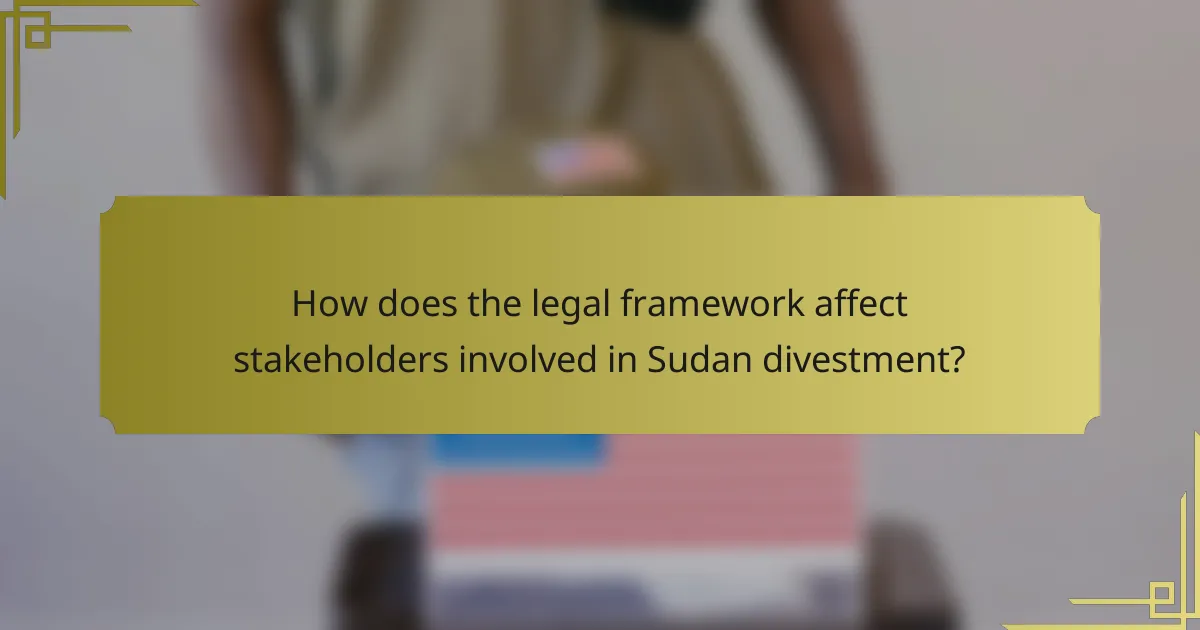
How does the legal framework affect stakeholders involved in Sudan divestment?
The legal framework significantly impacts stakeholders involved in Sudan divestment by establishing the rules and regulations governing investment decisions. It influences the actions of companies, investors, and governmental bodies. For instance, laws may mandate divestment from entities linked to human rights violations in Sudan. This creates pressure on companies to align with ethical standards. Additionally, legal requirements can affect financial penalties or incentives related to divestment actions. Stakeholders must navigate these legal landscapes to mitigate risks and comply with international norms. Historical context shows that legal frameworks have led to increased scrutiny of investments in Sudan, shaping stakeholder behavior and strategies.
Who are the primary stakeholders in the Sudan divestment process?
The primary stakeholders in the Sudan divestment process include government entities, non-governmental organizations (NGOs), investors, and advocacy groups. Government entities are involved in creating policies that facilitate divestment. NGOs play a critical role in raising awareness about the humanitarian issues in Sudan. Investors are focused on financial implications and ethical considerations regarding their investments. Advocacy groups mobilize public opinion and pressure stakeholders to act. These groups often collaborate to influence legislation and promote divestment strategies. Their collective efforts aim to address the humanitarian crisis and encourage responsible investment practices.
What responsibilities do corporations have under the legal framework?
Corporations have several responsibilities under the legal framework. They must comply with laws and regulations relevant to their industry. This includes adhering to labor laws, environmental regulations, and corporate governance standards. Corporations are also required to report financial information accurately to stakeholders. They must avoid fraudulent practices and ensure transparency in their operations. Failure to meet these responsibilities can result in legal penalties or reputational damage. For instance, the Sarbanes-Oxley Act mandates strict reforms to enhance corporate governance and accountability.
How do non-governmental organizations influence Sudan divestment efforts?
Non-governmental organizations (NGOs) influence Sudan divestment efforts by advocating for financial withdrawal from companies operating in Sudan. They raise awareness about human rights abuses and promote ethical investment practices. NGOs conduct research and publish reports that highlight the impact of investment on Sudan’s political situation. They mobilize public opinion and encourage consumers to pressure companies to divest. For example, organizations like Save Darfur Coalition have campaigned for divestment from companies linked to the Sudanese government. Their efforts often lead to legislative actions and policy changes that support divestment initiatives. This influence is critical in shaping the legal framework surrounding Sudan divestment efforts.
What are the implications of the legal framework for investors?
The legal framework for investors regarding Sudan divestment efforts imposes specific restrictions and obligations. Investors must comply with regulations that prohibit investment in certain sectors linked to human rights violations. These regulations can lead to financial penalties for non-compliance. Additionally, the legal framework may create uncertainty, affecting investment decisions. Investors might face reputational risks if associated with entities violating these laws. The necessity for due diligence increases, requiring thorough assessments of potential investments. Legal compliance can also limit investment opportunities in the region, impacting overall portfolio diversification. Understanding the legal landscape is crucial for risk management in Sudan-related investments.
What risks do investors face when considering divestment from Sudan?
Investors face several risks when considering divestment from Sudan. Political instability is a significant risk due to ongoing conflicts and governance issues. The Sudanese government has a history of abrupt policy changes that can impact investment. Economic sanctions imposed by various countries can also create a hostile environment for foreign investors.
Additionally, there are concerns about the lack of transparency in financial markets. This opacity can lead to difficulties in assessing the true value of investments. Human rights violations in Sudan can result in reputational risks for companies choosing to divest.
Lastly, there is the potential for legal repercussions related to compliance with international laws. These factors collectively contribute to a complex risk landscape for investors contemplating divestment from Sudan.
How can investors ensure compliance with the legal framework?
Investors can ensure compliance with the legal framework by conducting thorough due diligence. This involves understanding applicable laws and regulations related to Sudan divestment. Investors should review relevant legislation, such as the Sudan Accountability and Divestment Act. Consulting legal experts can provide clarity on compliance requirements. Regular audits of investment practices help identify potential legal risks. Staying informed about changes in laws ensures ongoing compliance. Engaging with regulatory bodies can provide guidance and support. Documenting all compliance efforts is crucial for accountability. These steps collectively mitigate legal risks associated with investments in Sudan.

What are the future prospects for the legal framework surrounding Sudan divestment efforts?
The future prospects for the legal framework surrounding Sudan divestment efforts are uncertain and evolving. Recent geopolitical changes may influence existing regulations. International pressure for ethical investment practices is growing. Legislative bodies may introduce new laws to enhance divestment mechanisms. Legal challenges could arise from affected parties opposing divestment initiatives. Additionally, compliance with international sanctions will remain a critical factor. The effectiveness of divestment efforts hinges on coordinated actions among stakeholders. Ongoing dialogues among governments, NGOs, and businesses will shape future developments.
How might changes in international relations impact the legal framework?
Changes in international relations can significantly impact the legal framework governing Sudan divestment efforts. When countries alter their diplomatic ties, it can lead to shifts in trade agreements and sanctions. For instance, improved relations may result in reduced sanctions, which can affect the legal obligations of companies regarding divestment. Conversely, deteriorating relations may prompt stricter regulations and increased scrutiny of investments in Sudan. Historical examples include the U.S. lifting sanctions on Sudan in 2017, which changed the legal landscape for businesses operating there. Additionally, international organizations may revise legal standards based on geopolitical shifts, influencing national laws on divestment. Such changes necessitate ongoing legal assessments for compliance by entities involved in Sudan.
What potential reforms could strengthen the divestment legal framework?
Enhancing the divestment legal framework can be achieved through several potential reforms. First, establishing clearer definitions of divestment criteria can provide consistency in enforcement. This clarity can reduce ambiguity for investors and regulators alike. Second, creating a centralized authority to oversee divestment activities can streamline processes and ensure compliance. This authority can facilitate communication between stakeholders. Third, implementing stronger penalties for non-compliance can deter entities from disregarding divestment laws. This approach can enhance accountability among corporations. Fourth, enhancing transparency requirements for divestment decisions can foster public trust. Stakeholders can better understand the motivations behind divestment actions. Finally, promoting collaboration with international bodies can align local laws with global standards. This alignment can strengthen legal frameworks and enhance their effectiveness in achieving divestment goals.
What best practices should stakeholders follow in navigating the legal framework?
Stakeholders should engage legal experts to navigate the legal framework effectively. Legal experts provide guidance on compliance with laws and regulations. They help interpret complex legal language and identify potential risks. Stakeholders should also stay updated on relevant legislation changes. Regular monitoring ensures that stakeholders remain compliant with evolving legal standards. Additionally, documenting all decisions and actions is crucial for accountability. This documentation can serve as evidence of due diligence if legal issues arise. Collaboration with other stakeholders can also enhance understanding of the legal landscape. Sharing insights and strategies can lead to better navigation of legal complexities.
How can stakeholders effectively advocate for changes in the legal framework?
Stakeholders can effectively advocate for changes in the legal framework by engaging in strategic lobbying. This involves building coalitions with like-minded organizations to amplify their voice. They should also conduct thorough research to present evidence-based arguments. This includes data on the impact of current laws and potential benefits of proposed changes.
Additionally, stakeholders can utilize public campaigns to raise awareness and mobilize public support. Engaging with policymakers through meetings and discussions is crucial. Providing clear, actionable policy recommendations can facilitate dialogue. Lastly, stakeholders should monitor legislative processes to respond promptly to developments.
What strategies can organizations adopt to align with legal requirements in Sudan divestment?
Organizations can adopt several strategies to align with legal requirements in Sudan divestment. First, they should conduct thorough legal assessments of existing regulations governing divestment in Sudan. This includes understanding both domestic laws and international sanctions that may apply. Second, organizations should establish compliance programs that incorporate ongoing monitoring of legal changes related to Sudan. Third, they must engage with legal experts who specialize in Sudanese law and international trade regulations. This ensures that organizations remain informed about compliance obligations. Fourth, organizations should develop transparent reporting mechanisms to document divestment activities and compliance efforts. Finally, they should consider collaborating with industry groups to share best practices and resources related to legal compliance in Sudan divestment. These strategies help mitigate legal risks and ensure adherence to relevant laws.
The main entity of this article is the legal framework surrounding Sudan divestment efforts, which encompasses state and federal laws aimed at restricting investments in Sudan due to human rights violations and the Darfur conflict. The article outlines the origins of this legal framework, key legislation such as the Sudan Accountability and Divestment Act of 2007, and the roles of international laws and national regulations in shaping divestment strategies. It also addresses the challenges faced by the legal framework, including enforcement issues and political influences, while highlighting the responsibilities of stakeholders and the implications for investors. The article concludes with potential reforms and best practices for navigating the legal landscape related to Sudan divestment.
